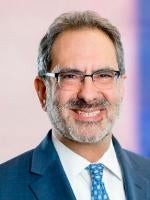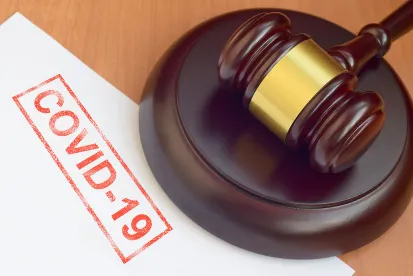The government continued to dedicate enormous resources to investigating and prosecuting fraud against COVID-19 pandemic relief programs[1] in 2023. While we observed some civil False Claims Act settlements, criminal enforcement continued to dominate COVID-19 enforcement headlines, with some attention-grabbing stories involving politicians, government employees, and those with connections to gangs and transnational crime networks.
False Claims Act Cases
The wave of civil pandemic fraud enforcement that we anticipate coming has not yet publicly materialized, but a few pandemic-related False Claims Act (FCA) cases emerged in 2023. A large medical institution agreed to pay more than $2 million to resolve fraud claims, including an allegation that it double-billed for COVID-19 testing. Specifically, a whistleblower alleged that the institution submitted claims to the Health Resources and Services Administration (HRSA) for reimbursement in connection with COVID-related care; however, the institution had already received reimbursement for the services by the State of Texas or City of Houston.
Two civil FCA cases involved allegedly medically unnecessary respiratory pathogen panel (RPP) testing added on to COVID-19 testing. Previously, DOJ pursued criminal penalties in matters involving similar conduct.
One civil FCA matter resolved in 2023 involved a Maryland-based billing company for diagnostic laboratories that agreed to pay roughly $300,000 to resolve allegations that it caused the submission of false claims to Medicare for medically unnecessary RPP testing run on seniors who received COVID-19 tests. The billing company received cooperation credit for performing and disclosing results of an internal investigation, providing information regarding other actors’ potential misconduct, and admitting liability.
DOJ similarly filed a complaint against an individual and multiple laboratory companies owned by the individual for offering COVID-19 tests to nursing homes as a way to bill Medicare for a wide array of medically unnecessary RPP tests. In that matter, DOJ alleged that the companies had submitted false claims to Medicare for RPP testing not ordered by providers, not medically necessary, and sometimes never performed, including testing ordered for over 300 deceased beneficiaries.
In a PPP-related case, an automotive group agreed to pay $9 million to resolve allegations that it violated the FCA by certifying that it was a small business in connection with a PPP loan obtained and later forgiven when, in fact, the company was under common operational control with dozens of dealerships across the country and had more than 3,000 employees.
Qui tam FCA lawsuits are filed under seal while DOJ investigates the allegations, which can sometimes take years depending on the complexity and scope of the alleged underlying fraud. For this reason, we expect more FCA lawsuits involving COVID-19 relief to become public in 2024 and beyond as the government’s investigations progress.
Provider Relief Fund
We also expect additional enforcement involving the Provider Relief Fund (PRF) in 2024, similar to the Civil Monetary Penalties Law settlements this year involving PRF payment recipients who were ineligible to receive or retain those payments.[2] The PRF, which was authorized by the Coronavirus Aid, Relief, and Economic Security (CARES) Act, was a major pandemic relief program that allocated $178 billion to hospitals, health systems, and all other health care providers that billed Medicare. The HRSA administered the program in four “phases” of payments, plus “hot spot” and targeted payments to providers. In June 2023, as part of the debt ceiling resolution, Congress rescinded all unobligated PRF funds in the amount of $27 billion. HRSA’s administrative recovery efforts, as well as DOJ’s civil enforcement activities, are now turning federal attention to recovery of funds that may have been obtained inappropriately.
A sign of this trend is a qui tam action unsealed in June 2023, and filed in November 2021, against several New Jersey hospitals, management services organizations, and the hospitals’ chief executive officer and chief financial officer for allegedly refusing to return PRF funds for which the defendants knew they were not eligible, and for allegedly using PRF money for impermissible purposes. The relator, the former system chief medical officer and chief hospital executive for one of the defendant hospitals, alleged that the defendant hospitals received over $50 million in “hot spot” distributions to which the hospitals were not entitled. The relator alleged that he repeatedly insisted that the hospitals self-report the overpayment and return the funds. PRF funds were administered on an emergency basis, often with little guidance or controls, which could make FCA enforcement difficult, and which could have led to DOJ’s declination in this qui tam action. But we expect further cases like this one to emerge, likely driven by relators.
Administratively, there have been Government Accountability Office and Health and Human Services Office of Inspector General (HHS-OIG) reports and audits on PRF disbursements. An HHS-OIG report published in October 2023 revealed that while HHS’s oversight was generally effective in ensuring that most of the approximately $39.3 billion in automatic PRF payments were properly calculated and disbursed to eligible providers, HHS did not ensure that approximately 5.5% of the disbursements were properly calculated, nor did HHS prevent less than 1% of disbursements from flowing to ineligible providers. To date, ~$2.6 billion in payments to noncompliant providers, overpayments, and unused payments have been identified for recovery by HRSA, but nearly $1.4 billion has yet to be recovered. There is much ground to cover in recouping improper PRF disbursements in 2024.
President Biden’s Pandemic Anti-Fraud Proposal and Proliferation of Pandemic Fraud Task Forces
In March 2023, President Biden introduced a $1.6 billion pandemic anti-fraud proposal focused in part on ensuring resources for investigations and prosecutions of major or systemic pandemic fraud. In furtherance of this goal, President Biden expressed a desire to triple the COVID-19 anti-fraud strike forces pursuing pandemic fraudsters.
Following President Biden’s remarks, the Department of Justice (DOJ) announced in August the creation of two additional COVID-19 Fraud Enforcement Strike Forces: one in the US Attorney’s Office for the District of Colorado and the other in the US Attorney’s Office for the District of New Jersey. There are now five COVID-19 strike forces, including those launched in September 2022 in the Eastern and Central Districts of California, the Southern District of Florida, and the District of Maryland. The strike forces are intended to strengthen the efforts and increase the reach of the COVID-19 Fraud Task Force established by the Attorney General in May 2021. The strike forces focus on large-scale, multistate COVID-19 relief fraud perpetrated by criminal organizations and transnational actors using prosecutor-led and data analyst-driven teams. The expansion of pandemic fraud strike forces signals the Biden administration’s investment in investigating and prosecuting major or systemic pandemic fraud.
Nationwide Actions
The fraud task forces demonstrated their value with two high-profile, nationwide takedowns in April and August 2023. These takedowns show the breadth of DOJ’s enforcement efforts and move the DOJ closer towards fulfilling its strategic goal of seeking restitution in at least 90% of applicable criminal cases concerning COVID-19 related fraud and increasing the percentage of COVID-19 related fraud cases resolved favorably to 90%.
In April, DOJ announced the first nationwide takedown of 2023. It included criminal charges against 18 defendants in nine federal districts across the country involving $490 million in COVID-19 related fraud — the largest ever coordinated law enforcement action in the United States targeting health care fraud schemes that exploited the COVID-19 pandemic. The April takedown showed the power of data analytics in rooting out pandemic fraud. A single doctor allegedly defrauded HRSA’s COVID-19 Uninsured Program (UP) by $230 million. This doctor was the second-highest biller to the UP in the country. The physician operated a small midwife practice, which transformed into one of the busiest vaccination sites in New York State, seemingly outpacing larger, state-run vaccination sites. The medical professionals who worked at this small midwife practice were charged with allegedly distributing nearly 2,700 forged COVID-19 vaccination record cards to unvaccinated individuals and destroying vials of COVID-19 vaccines intended to be used to inoculate patients.
DOJ expanded its COVID-19 enforcement success with another coordinated, nationwide action, announced in August 2023. This second takedown yielded charges against 371 defendants for offenses related to over $836 million in alleged COVID fraud affecting numerous federal programs, including the PPP, EIDL, and ERAP. Some 119 defendants arrested in the sweep pleaded guilty or were convicted at trial, and the cases resulted in restitution orders of over $57 million. The defendants arrested in the takedown included gang members who allegedly used pandemic funds to pay for murder for hire, and those with connections to transnational criminal networks.
As of August 2023, DOJ had seized over $1.4 billion in COVID relief funds and charged over 3,000 defendants with crimes in federal districts across the country.
Pandemic Fraud Enforcement Reached Beyond Professional Criminals
In addition to coordinated takedowns, 2023 saw a broad range of individuals sentenced to jail and ordered to pay restitution for COVID-19 related fraud. A former Missouri state representative sought government reimbursement for COVID-19 testing allegedly performed at her nonprofit clinic when, in fact, the testing had been performed at her for-profit clinic and paid for by the clients at the for-profit clinic. A former Florida lawmaker pleaded guilty to wire fraud, money laundering, and making false statements in connection with obtaining COVID-19 relief. A former IRS employee pleaded guilty in connection with a scheme to defraud the EIDL program by submitting a false application and using the loan proceeds for unauthorized purposes. And a Florida corrections officer was charged with wire fraud in connection with a PPP loan obtained for an allegedly non-existent business. We anticipate additional high-profile cases in 2024.
Conclusion
With over $4.6 trillion in pandemic relief funding authorized since March 2020 and estimates of over $300 billion in fraud on pandemic relief programs thus far, we expect continued criminal enforcement into the foreseeable future as the government works to root out and prosecute the most nefarious and egregious fraud. The government cannot prosecute all pandemic relief–related fraud cases, but it seems to be focused on the cases likely to result in large monetary recoveries or cases that will generate substantial media coverage (which will, in turn, at least theoretically deter others from engaging in similar conduct). That said, given the government’s continued investment in resources to investigate and prosecute pandemic relief fraud, and the sheer breadth of estimated fraud on pandemic relief programs, we anticipate criminal and civil actions will continue in 2024 and beyond.
Endnotes
[1] The federal government authorized several programs to assist the country with responding to and recovering from the COVID-19 pandemic, including:
1) The Small Business Administration’s (SBA) Paycheck Protection Program (PPP), which provided small businesses with funds to cover payroll and benefits costs;
2) SBA’s Economic Injury Disaster Loan (EIDL) program, which administered low-interest loans to help small businesses and nonprofits meet obligations and cover operating expenses;
3) The Federal Reserve’s Main Street Lending Program (MSLP), which supported small and medium-sized for-profit and nonprofit organizations;
4) The Unemployment Insurance Program (UI), administered by the Department of Labor, for those who lost their jobs through no fault of their own;
5) The US Treasury’s Emergency Rental Assistance Program (ERAP), which provided funding to grantees to assist low-income households;
6) The Department of Health and Human Services’ Health Resources and Services Administration (HRSA) Provider Relief Fund (PRF), which provided grants to health care providers; and
7) HRSA’s COVID-19 Uninsured Program (UP), which reimbursed health care providers for COVID-related treatment provided to uninsured individuals.
[2] There were also several federal cases filed against HRSA alleging that it illegally failed to disburse PRF funds to hospitals as required by law, including one filed by Mintz on behalf of a prominent hospital in New York.





 />i
/>i

